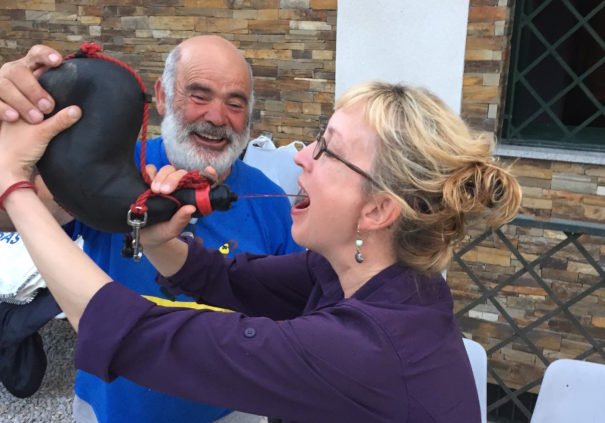
We’ll Skip the Long Religious Hike But That Donkey Driver Sounds Like Quality People

We’ll Skip the Long Religious Hike But That Donkey Driver Sounds Like Quality People
Red wine in Ponferrada
“Our position ist here,” said Martin the German policeman, pointing to a screenshot map of Ponferrada—a town best known for its 12th-century Templar castle, in the Bierzo region of northwestern Spain.
We teased Martin for his orderliness: his rucksack contents were meticulously sub-bagged and labeled in three languages. But we appreciated his geographical exactitude. He led us straight to a little grocery store attached to a Shell station, where we provisioned for 15.
When a tribe of pilgrims comes together on the Camino de Santiago, everyone specializes; odd talents rise to the surface. My husband Hal sang and cooked; I did rudimentary translating and was best known for an ability to speed-pee without dropping the pack. Martin navigated and performed acts of gallantry: he once backtracked several kilometers to shoulder an
injured Swiss friend’s pack as she limped into Santo Domingo de la Calzada, a town best known for a poultry-related miracle.
Frida the Swede instigated wine drinking and merriment, and on one occasion, ministered to a friend laid low by wine drinking and merriment—the same Swiss pilgrim previously rescued by Martin. Providing opportunities for would-be rescuers was her specialty.
In the Ponferrada hostel kitchen, Frida took charge of pasta sauce-making; Heinrich, a cheerful German in a felt “Wander Hut” hiking hat, prepared salads, and I assembled tapas platters: sautéed mushrooms, cured meats, soft cheeses, and membrillo (quince paste). As we worked, we chefs sipped from a private stash of Mencía, a fruity varietal from the Bierzo.
After dinner, Frida and I headed outside with our second bottle of Mencía. In the courtyard, we met Ginés, an arriero—a person who transports goods by pack animal—who was walking from Bilbao to Santiago de Compostela and back with his burro, Marina, and a small dog named Escoti.
I’d previously learned the word arriero because of a Basque sandwich. At a town festival in Navarra, hundreds of miles back east, I ate a bocadillo piled high with Lajoarriero—literally, “muleskinner’s garlic.” It was a delicious dish I hoped to see more of, made from cod, garlic, tomato, and pepper, created long ago by Basque pack-mule drivers as a way to enliven the preserved salt cod they carried.
Now, here was a real live muleteer-peregrino. His dog sometimes, but not always, rode on the burro’s back. Ginés demonstrated this for us, setting Escoti delicately upon Marina with a blast of laughter.
Ginés the muleskinner sometimes, if not always, preferred his wine from a bota—a traditional leather canteen-bag. It is capable of dispensing any kind of liquid, but why would it? Spanish wine is delicious, and is often cheaper than bottled water—especially if you’re not married to any specific varietal. Ginés was not.
Bota-drinking lessons were Ginés’s specialty. He took charge of demonstrating proper bota usage to Frida and me: Open wide. Squeeze the bota. Aim haphazardly and from a great distance. Prepare for impact. Repeat.
We passed the wineskin around as Hal and the mule-driving bilbaíno sang “Adiós Muchachos,” an Argentine tango Hal’s mother taught him when he was little. “I love my burro!” announced Ginés when the song was over, a moment before the beast stomped his foot. “Joder, puta!” he shouted. (No translation needed.)
Calle Obispo Camilo Lorenzo, 2, 24401 Ponferrada, León
Check in: After 13:00pm. No entry after 22:30; lights out at 22:30.
Check out: Between 6:00 and 8:00am.